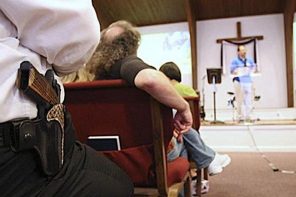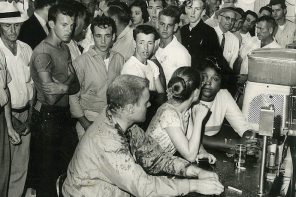It was a bit ironic, though revealing, that the McCain-Palin campaign chose to use Sarah Palin’s RNC speech to assail Barack Obama’s work as a community organizer in developing its symbolic offensive strategy against the Obama-Biden ticket. On the evening of Wednesday, September 3, both Rudolph Giuliani and Sarah Palin cited Obama’s years as a community organizer as an indication that he’s too inexperienced to be president. Palin said: "I guess a small-town mayor is sort of like a ‘community organizer,’ except that you have actual responsibilities," a remark that was greeted with enthusiastic applause from the Republican convention delegates.
For several decades now, American presidential nominating conventions have been little more than media events. Most major decisions about the composition of presidential tickets —
and even policy platforms — are made well before the speaker hits the rostrum. The delegates serve a largely symbolic role, and the speakers’ real audience is the electorate at large, following (or so both political parties hope) convention coverage at home on television and the Internet. Thus, the rhetoric that emerges from presidential nominating conventions should be viewed primarily as direct appeals to the average voter — and,
in recent times, targeted to increasingly narrow subsets of the electorate — the chimerical "swing vote." Both parties endeavor to communicate directly to their most important constituencies via the nominating conventions. Increasingly such messages are presented in vague, symbolic ways, lest voters with presumably short attention spans become overwhelmed or bored with the details of public policy proposals.
Thus it is appropriate to analyze much of the rhetoric that emerged from both parties’ nominating conventions in symbolic, rather than deeply substantive, terms. Both parties and their candidates design their convention presentations in ways that encourage Americans to absorb images first and policy details second (one might say a distant second). Such is the nature of the high-tech marketing strategies underlying twenty-first century American politics. Today’s presidential campaigns succeed or fail largely based on the extent to which broad symbolic narratives are communicated effectively to key portions of the American public.
2.
"Contrary to Palin’s disparaging remarks, organizers have major responsibilities for creating policy changes. Feeding the hungry and housing the homeless are clearly responsibilities of people of faith. We do that by providing food and shelter and more importantly, by organizing to address the causes of injustice and inequity which lead to hunger and homelessness." — Kim Bobo, Executive Director of Interfaith Worker Justice and
Religion Dispatches columnist.
At one level, the Republicans’ attack on this component of Obama’s resume is ironic, as his community-organizing work took place under a faith-based umbrella. Survey data from the Pew Forum on Religion & Public Life suggest that Americans view the Republican Party as
substantially more "friendly toward religion" than the Democrats in recent years, and indeed the McCain-Palin ticket cannot win in November without broad support from religious constituencies. Moreover, the Bush administration has been a vocal advocate for local-level, faith-based social service delivery, creating the White House Office of Faith-based and Community Initiatives soon after his 2001 inauguration. Whatever the real effect of the policies, one might also view Bush’s emphasis on "compassionate conservatism" and local-level faith-based engagement as an extension of a longer-term Republican enthusiasm for community volunteerism. George H. W. Bush, for example, famously referenced "a thousand points of light… all the community organizations that are spread like stars throughout the Nation, doing good" in his 1989 inaugural address and at various other times during his presidency.
3.
Faith-based community organizing is neither a new phenomenon nor a rare one, so any discussion of faith-based social service delivery by either political party must include community organizers. Saul Alinsky initiated the idea of faith-based community organizing in the 1930s, challenging people in impoverished urban areas to address their neighborhoods’ various socioeconomic and crime-related challenges themselves — in partnership with local religious leaders, who had the wherewithal to lead such initiatives. Alinsky founded the first community-organizing network,
the Industrial Areas Foundation, to coordinate this sort of faith-based work across cities. Before long, additional community-organizing networks emerged, including the
Chicago-based Gamaliel Foundation. In the mid-1980s, Obama worked for the Gamaliel-affiliated Developing Communities Project on the far south side of Chicago, arguably as one point of light among Bush’s thousand. Today, faith-based community organizing has spread beyond large urban areas to small cities, suburbs, and rural areas.
Critics charge that some faith-based community organizers are too radical. To be sure, community organizing is a confrontational activity; Alinsky intended it to be. Faith-based community organizers frequently prod local governments to address the complex challenges of poverty and violence in their neighborhoods (Giuliani, of all people, should know what community organizers do as the former mayor of our nation’s largest city). However, if we leave disagreements over tactics aside, it is fair to say that the general goals of ameliorating poverty and ending violence are widely shared by American people of faith across religious traditions. Such work is consistent with Catholic social teaching’s goal of upholding a "culture of life" (a phrase popularized by Pope John Paul II and repeated frequently by the current President Bush — as well as by John McCain in his Thursday evening acceptance speech). The fight against poverty and violence is also consistent with mainline Protestants’ longstanding tradition of helping "the least of these" (Matthew 25:40 — a verse that has inspired a good deal of political mobilization by the religious left, most recently in the form of the new Matthew 25 Network). Perhaps most notably of all, the twin goals of fighting poverty and violence are also consistent with the expanding political agenda of many evangelical Protestants, including prominent evangelical clergy such as Jim Wallis and Rick Warren.
Yet the Republicans still chose to assail Obama’s background as a faith-based community organizer. Might this have been a strategic misstep for a party that relies on the electoral support of millions of so-called "values" voters? Was it instead evidence of a broader symbolic indictment of Obama as being too liberal for mainstream America? Or, perhaps it was just an indication of how invisible the religious left has been for decades? A case may be made for each of these possibilities.
4.
First, the GOP might simply have chosen unwisely in mentioning Obama’s background as a community organizer. The Obama campaign immediately responded to this line of attack with email messages to supporters that evidently yielded over $8 million in donations in the 24-hour period between Palin’s speech and that of McCain. According to the blog area of Obama’s website, one of the email messages asked: "Why would the Republicans spend a whole night of their convention attacking ordinary people? With the nation watching, the Republicans mocked, dismissed, and actually laughed out loud at Americans who engage in community service and organizing."
This particular line of attack also seems to be galvanizing community organizers themselves to speak out in vigorous defense of their work. In short, the community-organizing crack may have launched a thousand ships of counter-mobilization.
On the other hand, perhaps this portion of the Republicans’ symbolic attack on Obama was strategically savvy after all. The principal theme of the McCain-Palin campaign’s offensive strategy is rather clear: they believe Americans should not elect Obama because he lacks sufficient experience to be president. The community-organizing criticism reinforced this theme, particularly by compelling Obama and his supporters to defend the political relevance of community organizing. Perhaps the GOP also thought that the mere mention of Obama’s work as a community organizer might return Jeremiah Wright’s name to the fore, since it was during his time as a community organizer in Chicago that Obama met Wright and began attending Trinity United Church of Christ. Moreover, since some critics charge that community organizing is radical, perhaps the GOP chose to mention it as part of its general strategy of subtly painting Obama as too liberal for mainstream America.
5.
This much is clear: the Republican Party continues to aim its symbolic appeals to a particular sector of religious America: conservative evangelicals and traditional Catholics, the "values" constituency that formed the core of Bush’s base — especially in 2004. Until last week, however, there were grave concerns in GOP circles about McCain’s ability to rally values voters this time around. McCain’s choice of Palin as his running mate—coupled with the veiled suggestion that Obama’s faith-based work might not represent a correct interpretation of either politics or theology — may be perceived accurately as symbolic messages aimed at a specific religious constituency.
The fact that so few Americans know much about faith-based community organizing is politically telling. Faith-based community organizing is a central component of today’s "religious left," yet it is not usually the subject of much media reporting or public attention in general. In part this is due to the simple fact that the religious right (justifiably) has attracted a great deal of attention over the past three decades for its rise to prominence and its electoral significance. In contrast, the religious left lacks national coordination, hindering its ability to articulate any sort of unified vision of how religion and politics might connect through a range of issues that lie outside of the religious right’s standard abortion/homosexuality/family rubric. Running a successful campaign for office depends on being able to identify and reach out to unified political constituencies. As long as the religious left is less unified than the religious right, it will be much easier — and more expedient — for politicians to speak symbolically to conservative people of faith than to liberal people of faith.



